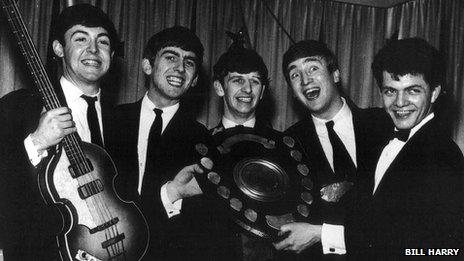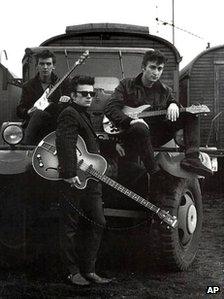Looking back at the birth of The Beatles
- Published

Bill Harry (right) presented The Beatles with the Mersey Beat Shield in 1962
Bill Harry went to art college with John Lennon, ran the Mersey Beat newspaper and arranged for the band's future manager Brian Epstein to see them at the Cavern Club for the first time.
"It was an epiphany," Harry says of the first time he set eyes on John Lennon at college.
"I remember the particular moment exactly as it happened. I was sitting in the canteen, suddenly I looked up and this guy was striding by and he was like a teddy boy. He was quite striking.
"I saw all the other art students in the canteen and virtually every one of them was in a duffle coat and turtle-neck sweater. I thought blimey, they're supposed to be non-conformists and yet they all look the same. That guy is the one who looks different, he's the rebel, he's the one I'd like to meet.
"So I got to know him and took him to our local pub and introduced him to Stuart Sutcliffe and Rod Murray.
"He was a Jekyll and Hyde character. With me, Stuart and Rod, the four of us called ourselves The Dissenters. We used to talk about art and literature and read books by the San Francisco poets and the Olympia press in Paris.
"Then on the other hand, John went with this other bunch from the art college and used to get drunk and steal and get up to all sorts of mischief. With them he'd be rough, aggressive, wild, and with us he was talking about creative ideas and inspiration.
"When The Dissenters got together, we made a vow to make Liverpool famous. John would do it with his music, Stuart and Rod with their painting and I'd do it with my writing. That was the aim. But we didn't know how big things would get.
"There was great creativity, particularly in the Liverpool 8 area where we lived. We had the Mersey poets, country music groups, folk groups, sculptors, comedians, and we knew them. We used to drink together. We felt we were right in the middle of something that was mushrooming. We really made an effort to change things and create things.

Stuart Sutcliffe (centre) was a member of the band but died in April 1962
"I booked The Beatles for the art college dances. We used to do dances on a Saturday night. Paul and George were next door to us in the Institute [The Liverpool Institute High School for Boys] and they used to come into the canteen.
"I was there when John and Stuart came up with the name Beatles. I just called them the college band because they weren't using The Quarrymen any more and couldn't seem to think of a decent name.
"They were sitting talking in Gambier Terrace [where Lennon and Sutcliffe shared a flat] trying to think of a decent name - they'd come up with silly names like The Moondogs.
"Stuart was saying 'We play a lot of Buddy Holly numbers, how about a name like Buddy Holly's backing band The Crickets?' And John said 'Yeah, let's think of insects'. So they tried The Beetles. It was in August 1960 that they finally decided on The Beatles.
"When I took the first edition of Mersey Beat to all the music shops, I went into [Brian Epstein's shop] Nems and asked to see the manager. Brian came down, I told him about the paper and he took a dozen. In the afternoon, he phoned me and couldn't believe that the dozen had sold straight away. For issue two, he ordered 12 dozen copies.
"The entire front cover was 'The Beatles record in Germany' with a photo of the leather-clad Beatles. He called me into his office and asked if he could be my record reviewer. I said OK, so his reviews appeared in issue three.
"He took me to lunch twice to ask about The Beatles and then asked if I could arrange for him to go down to the Cavern. He didn't want to stand in a queue with kids. So I phoned and Brian went down with his assistant and that's how it happened.
"It was with Love Me Do when they realised it was going to take off - they suddenly felt, this is it, we've made it. That was the turning point."
Bill Harry's new e-book titled Love Me Do, about the story of the song, is out now.
- Published2 October 2012
- Published2 October 2012
- Published2 October 2012